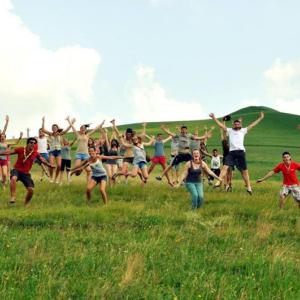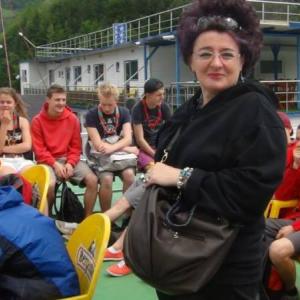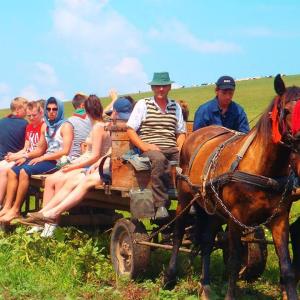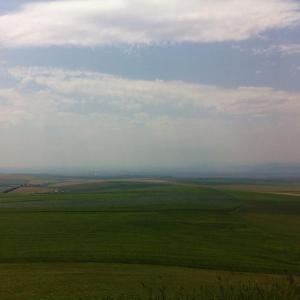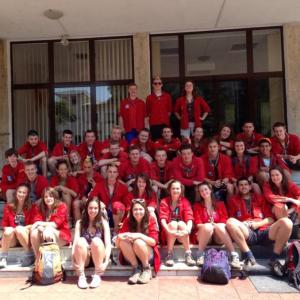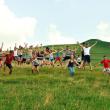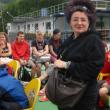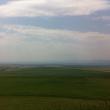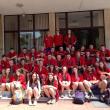Somewhere in between: Visions of Romania
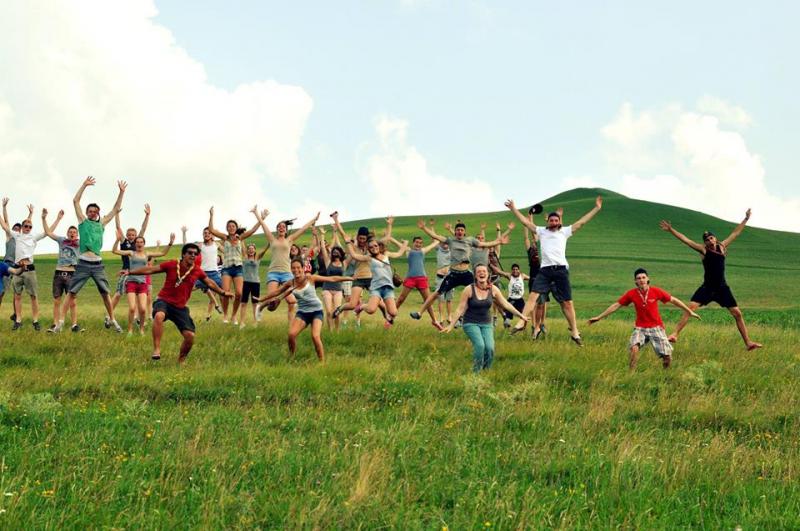
 Georgeta, the pleasantly tyrannical headmistress. (Photo by Ari Snider)
Georgeta, the pleasantly tyrannical headmistress. (Photo by Ari Snider)
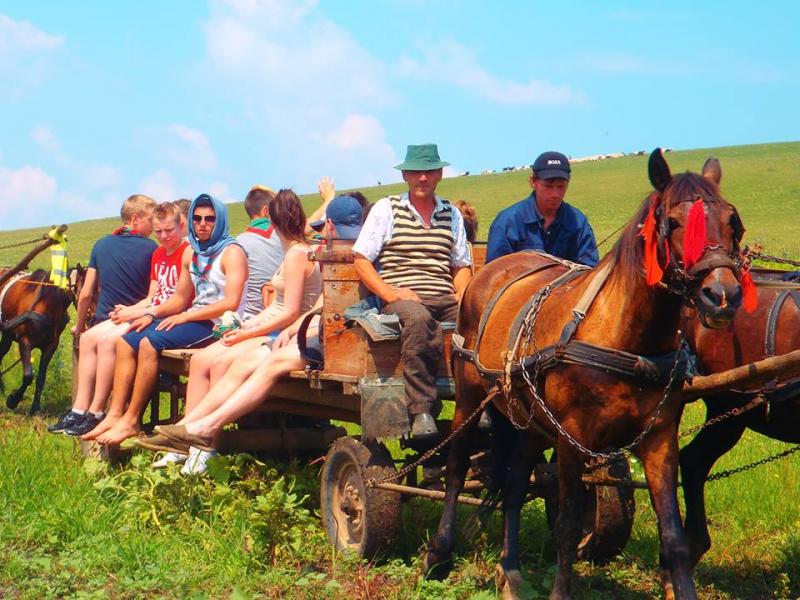 We load onto three carts, legs dangling over the edges, and roll into the surrounding fields. (Photo by Ari Snider)
We load onto three carts, legs dangling over the edges, and roll into the surrounding fields. (Photo by Ari Snider)
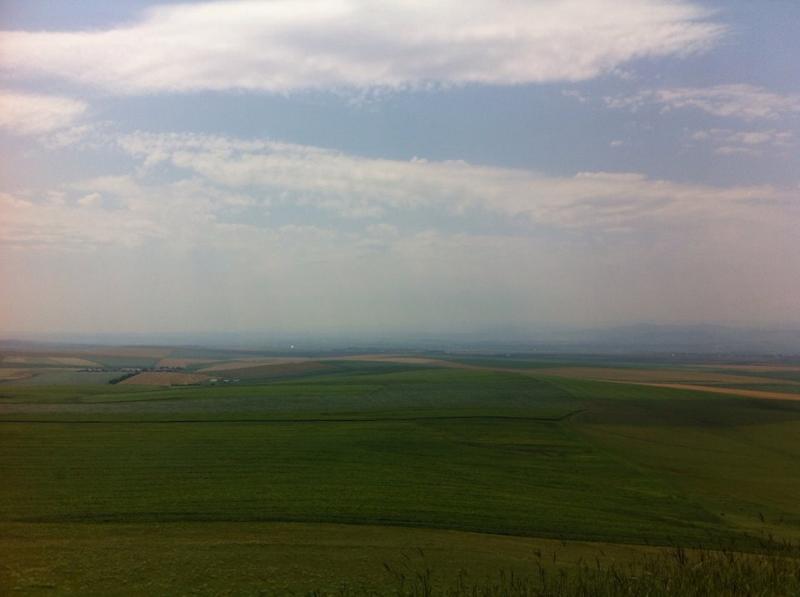 The infinite vistas of rural Romania. (Photo by Ari Snider)
The infinite vistas of rural Romania. (Photo by Ari Snider)
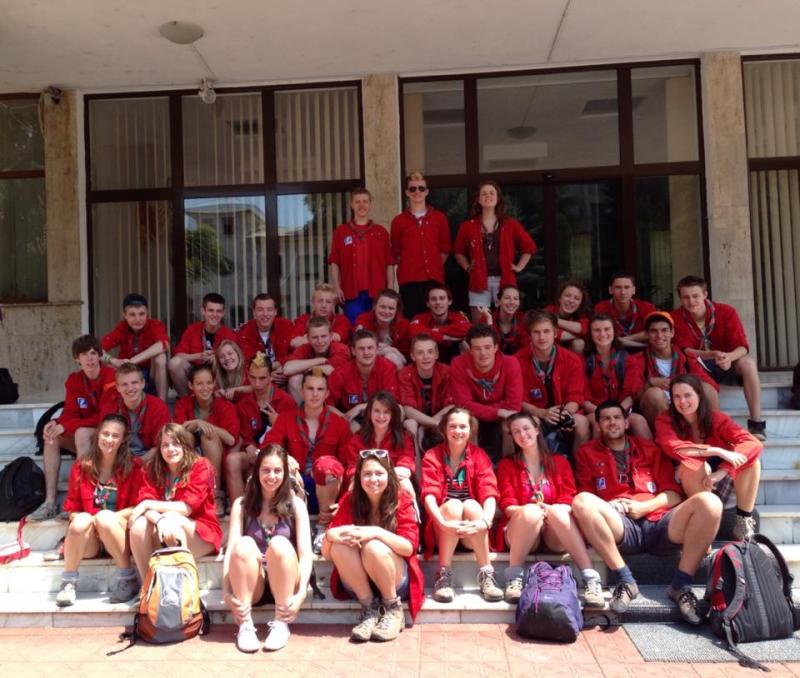 Totemized, I am finally a real scout. (Photo by Ari Snider)
Totemized, I am finally a real scout. (Photo by Ari Snider)
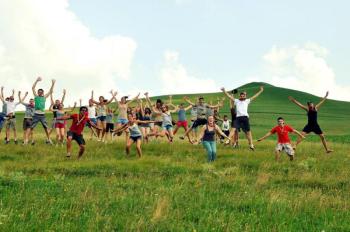
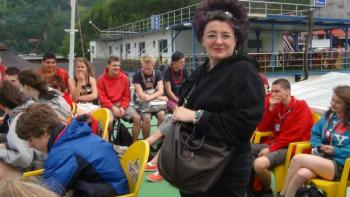 Georgeta, the pleasantly tyrannical headmistress. (Photo by Ari Snider)
Georgeta, the pleasantly tyrannical headmistress. (Photo by Ari Snider)
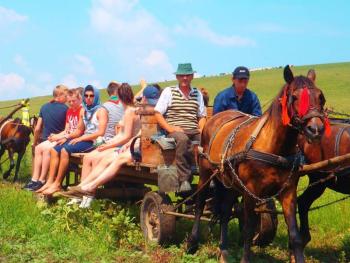 We load onto three carts, legs dangling over the edges, and roll into the surrounding fields. (Photo by Ari Snider)
We load onto three carts, legs dangling over the edges, and roll into the surrounding fields. (Photo by Ari Snider)
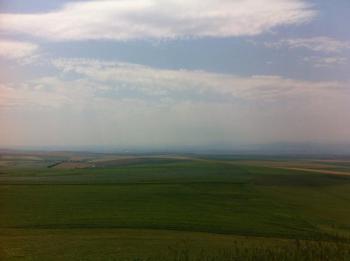 The infinite vistas of rural Romania. (Photo by Ari Snider)
The infinite vistas of rural Romania. (Photo by Ari Snider)
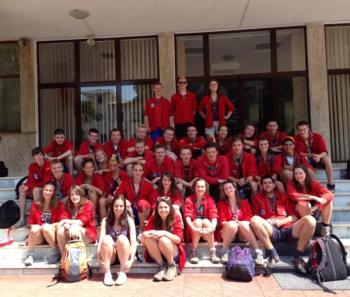 Totemized, I am finally a real scout. (Photo by Ari Snider)
Totemized, I am finally a real scout. (Photo by Ari Snider)
June 28
According to the small television screen attached to the cabin ceiling, we are somewhere over Germany, but out the window I see only a thick carpet of clouds. The goodbyes in Belgium have left me physically and emotionally fatigued, but I am nevertheless happy to be with my fellow Scouts en route to Romania for the final installment in my grand European adventure.
We touch down on Romanian soil after two and a half hours of smooth flying, which is all it takes to cross the entire European continent. At the airport we pack like sardines into a city bus that rumbles into the center of Romania's capital.
June 29
We catch several winks of sleep at the X Hostel before shouldering our packs again and setting out to find the train station. The flat predawn light accentuates the contrast between the grimness of Bucharest's massive Soviet-era apartment blocks and the awkward flashiness of the billboards and department stores that have elbowed their way in since the fall of Communism.
There are no places left on the train, so we lay our sacks down and sleep on the dirty concrete platform of Bucharest's North Station. Stray dogs and humans scavenge for food.
Finally on the train. To our collective delight, it has separate compartments, each one featuring a large window, wooden paneling and a sliding-glass door opening onto the hallway, just like the Hogwarts Express in the Harry Potter series. I share my compartment with three other Scouts and two Romanians, a man and a woman who appear to be in their late twenties.
The whistle blows and the train rolls slowly out of Bucharest, clunking past scattered residential districts where Romania's ever-present population of homeless canines roams dejectedly through neighborhoods of tin-roofed houses.
Leaving the city proper, we chug into the fields and patchy forests of the Romanian countryside. From time to time we pass through small villages where cows graze on the weeds that all but obscure the rails. The crumbling corpses of abandoned factories loom over such villages. Empty train cars sit immobile on grass-covered tracks, rusting quietly under a fiery sun. Brown, sun-beaten faces turn as our train passes. The woman seated next to me gives me her window seat so I can write on the small table protruding from the windowsill.
A comfortable window seat and a quiet sense of liberty. So far away, so purely at ease. Having left Belgium but not yet returned home, I am somewhere in between two lives. Delicate purple flowers are growing beside the tracks.
Endless fields of sunflowers and a train laden with coal. Electric wire poles marching across the landscape like an army of metallic stickmen. The grass on the tracks grows so thick that it blurs the contrast of the rail line with the fields alongside. A battalion of stickmen stomping through sunflowers. Between waves of sunflowers, scrub and concrete. Shirtless men and skinny horses waiting at a junction. Black earth and aluminum churches. Poverty on the banks of a muddy river.
I fall asleep as we drift through the infinite landscape.
After six hours on the train, representatives from the school that we will be living in and painting pick us up from the station in Baçau. Georgeta, a middle aged woman of solid build whose voluminous purple hair gives the impression of having spent too much time poking around nuclear power plants, clearly establishes herself as the chief with her strong presence and shrill commands. We learn that she is the headmistress of the school that we will paint and live in. Georgeta orders us into three minibuses, or, as she calls them, microbuses (pronunciation: MEEEEcrobuhz).
There are not enough seats in the buses, but our hosts have put several loose chairs with leopard-print upholstery in the aisle. Rules of the road? Ha. We give our driver the nickname “Schumy,” after NASCAR driver Michael Schumacher.
After installing ourselves in a sort of cultural center/church/dormitory in Roznov, the soccer players among us hustle to the concrete pitch behind the school across the street. In no time, a small crowd of curious local boys gather round to watch, and soon join in. Soccer may be the most important language in the world.
July 1
I sit in the front passenger seat for the microbus ride to Dochia, the site of our ten-day project: repainting a school and playing with the local kids. The driver is not Schumy, but a large man with tanned skin and flip-flops. A smoldering cigarette dangles from his thick fingers as he swerves past the familiar morning traffic of horse carts and stray dogs.
“Dochia,” the driver announces with a gesture of mock grandeur as we enter the small village pasted onto the shifting waves of wheat and corn. The driver barely slows as he swings the bus down the pockmarked “Strada (Street) 2”, one of two paved roads in the town. Toothless, sunbeaten faces track us from behind metal and wooden fences. Barefoot children play in the street as farmers prod their cattle to pasture. Old women sit on rickety benches and squint at us from under colorful headscarves. Stray dogs sleep in the shade of small trees.
Minutes later, we pull up at Dochia's three tidy, single-story school buildings. We set to white-washing the walls. Catalin, the school's English teacher, takes a special interest in us. A short man in his late twenties, he sports skinny jeans, a striped v-neck and spotless Converse sneakers. A professional photographer in his free time, he snaps pictures all day. He has never been to an English-speaking country, but dreams of visiting Great Britain.
He has many opinions on education to share with us. “The teachers should be like conductors,” he says, “not bosses.”
“School here is generally boring for the kids,” he continues. “I would love to take my kids out of the classroom more often, to show them the world. The school system here teaches learning for today, not learning for tomorrow. I want to help them love learning for the rest of their lives.”
July 2
The school's janitor-caretakers, two middle-aged women and a large, pot-bellied man, have taken a special interest in me, mainly because I make a point of approaching them with a big smile and the five Romanian words I have picked up. Romanian's Latin roots tie it to French, Spanish, and Italian, giving me some footholds on basic comprehension. When people speak, I can grasp a word here or there, and when reading I can sometimes understand full phrases.
July 3
My friend Guillaume and I are picking up litter from the street when a small black cat appears at our heels. Our skinny feline companion keeps pace with us, and rubs himself, purring, against our legs whenever we stop. Guillaume proposes slipping him into a suitcase and bringing him back to Belgium, but eventually the cat turns tail and disappears behind a fence. We watch for him over the next week but never see the cat again.
The trash-pickup walk leads us to the house of the local math professor. A skinny man sporting a polo shirt and a crisp pair of khakis, he welcomes us under a plastic canopy that casts a greenish glow on the small patio. His stout wife emerges from the house with glasses and water bottles that she sets on the picnic table. As government employees, the teachers have some of the most generous, and certainly most reliable, salaries of anyone in the village.
I have known my fellow Scouts since September, when my first host mother signed me up to join my host brother's troop. However, Living together 24/7 during this Camp, or typical end-of-year voyage, allows me to better appreciate the many fantastic personalities and easygoing group spirit of the mixed-gender troop.
July 4
Happy Fourth of July!
Ever an ambassador for Ultimate Frisbee, I break out my Discraft Ultrastar and spread the good word of the floating disc among the Romanian youth.
July 5
A bright-eyed little boy named Tony has been following me around. Like most of the local kids, he spends his days roaming freely about the town. Unlike most of the other kids, he has a bicycle, which he lets me take for a spin.
Tony joins us for a horse-cart ride out into the surrounding fields. Carts are more common than cars in Dochia. Most consist of several weathered boards fastened to a rusted chassis. We load onto the back of three carts, legs dangling over the edges, while the owners climb onto elevated drivers' benches at the front.
The horses strain in their harnesses, their flanks glistening from sweat under the cracking of the farmer's whip. In the back of the cart, my friends launch into rousing renditions of classic Scout songs.
July 7
We had prepared a plethora of field games to play with the local kids, an activity that was supposed to be a centerpiece of our Dochia project that Georgeta had more or less brushed aside. Until today. At least twenty-five kids, ages 10 to 16, gather on the soccer pitch opposite the school. With the aid of Diana, a local girl who speaks remarkably good English, and myself, who speaks remarkably rusty English, we manage to explain the different games.
The entire trip to Romania is an experiment in alternative communication. Even with the option of direct translation, hand signs and acted demonstrations often prove most effective. Communicating in this way with the village children is a real pleasure. Many are shy, but laugh at our ridiculous attempts to act out what we want to say and soon throw themselves with gusto into the games.
July 8
I undergo my Totemization, the most sacred ritual of the Belgian Scouting system. This grueling 24-hour process—the details of which I am sworn never to reveal—determines the animal that embodies the essence of one's true character. The ancient spirits of the Scouting movement dubbed me Shiba, for an ancient breed of hunting dog native to the mountainous northern reaches of Japan.
Ari Snider of Belfast recently completed his junior year of high school studying in Belgium through Rotary International. His discoveries and adventures abroad were the subject of his blog Belfast/Belgique
July 9
I am kicking a soccer ball around with some friends behind the school, when the big man who works as a sort of general caretaker calls my name. He stands on the steps of an entrance to the school that I had never noticed. He beckons at me and mimes a drinking gesture. I hesitate, imagining bathtub moonshine of ungodly alcohol content. “Coffee,” he says.
He opens the imposing metal door and ushers me into a cramped, dingy closet, where a massive wood-fired steam engine boils water for the school's heating system. A small, deeply tanned man whose pants are cinched tightly against his skinny waist squats in the corner. He smiles and nods as I enter, and I wish him a “bună ziua,” or good day.
The big man motions me to a small fuel tank on which he has placed a thin cushion. He then procures a rusted pot, a coiled wire, a ratty power cord, and electrical clamps from one of the many wooden shelves. After filling the pot from the sink, he clamps the coiled wire into the clamp ends, attaches the clamps to a wall socket, and lowers the wires into the pot to heat the water. Having set the water to boil, he seats himself heavily on a box across from me and begins to talk.
Communication proves to be an involved affair. I listen attentively, clinging to any word or phrase that sounds at all familiar. After processing a question, I draw on the several Romanian words I know, along with my extensive knowledge of French, my decent knowledge of Spanish, and my minimal knowledge of Italian, to respond. But mainly I just flail my arms around and smile in desperate attempts to convey my thoughts.
We continue in this manner for nearly an hour-and-a-half, so long that I am late for lunch. Though it seems almost unbelievable in retrospect, we discuss—and reach mutual comprehension on, I think—subjects such as my perceptions of Romania (foarta bine, or very good), my situation as an American exchange student studying abroad in Belgium for a year, how I entered the scouting movement, and the benefits of language immersion. One year, I tell them, is the time it would take me to learn Romanian.
Just as the coffee creeps to a boil, the other janitors, two middle-aged women, enter. One's name is Gabby. I recognize the other, whose name I have not learned, by her wide, toothless smile. The big man, it turns out, is the husband of the woman with the toothless smile. He offers me a small white mug of jet black coffee. I take it, thanking him profusely in four languages. He gestures for me to take a teaspoon of sugar, but abstains himself. He then serves the others.
The coffee is watery but bursts with eye-watering strength as undissolved clumps of powdered coffee explode in my mouth. Over coffee, our conversation ventures into deeper, more complex topics. My hosts express special interest in what we scouts eat on a daily basis. Cereal, pasta, sandwiches, mainly food that's easy to prepare for large groups, I explain. Meat, I add. That catches their attention. The big man pulls a greasy, crumpled paper from his pocket, flattens it, and holds it out for me to examine. It shows his salary: 700 lei—roughly $200—a month. It becomes clear that meat is an unaffordable delicacy.
Another important question, which they labor to communicate and I to understand, regards the particularities of American marriage customs. I thus find myself acting out a typical American wedding—playing the roles of groom, bride, best man, preacher, and guests—in the boiler room of a small village school in rural Romania.
I am sweating from exertion, and the potent coffee does not help. But my hosts' constant smiles and welcoming spirit put me at ease. They ask about my parents' professions. I explain that they both have experience in journalism, and that I myself have a special interest in writing, an interest that compels me to keep a journal throughout my voyage in Romania. “You must write about Romania, in America!” They exclaim.
“Da”, I answer. “Yes.”
July 28
Our voyage to Romania was the perfect way to end my year abroad. After two weeks of splendid fun and unexpected adventures, I was sad to bid my fellow scouts farewell on July 15 in the Brussels Airport. I lifted off Belgian soil for good the next morning, and by nighttime found myself back in my own bed in Belfast, Maine.
My year as an exchange student in Belgium has come to a close, but my life as a writer is only just beginning. Returning home has inspired me to write about my life amid the wooded hills, salty bays, and rocky beaches of Midcoast Maine. For those interested in joining me as I rediscover home after a year abroad, I invite you to visit my new blog Where the Mountains Meet the Sea.
Thank you all for participating in this grand adventure by reading Belfast/Belgique. It was a pleasure to share my year abroad with you.
All the best,
Ari Snider
Event Date
Address
United States

